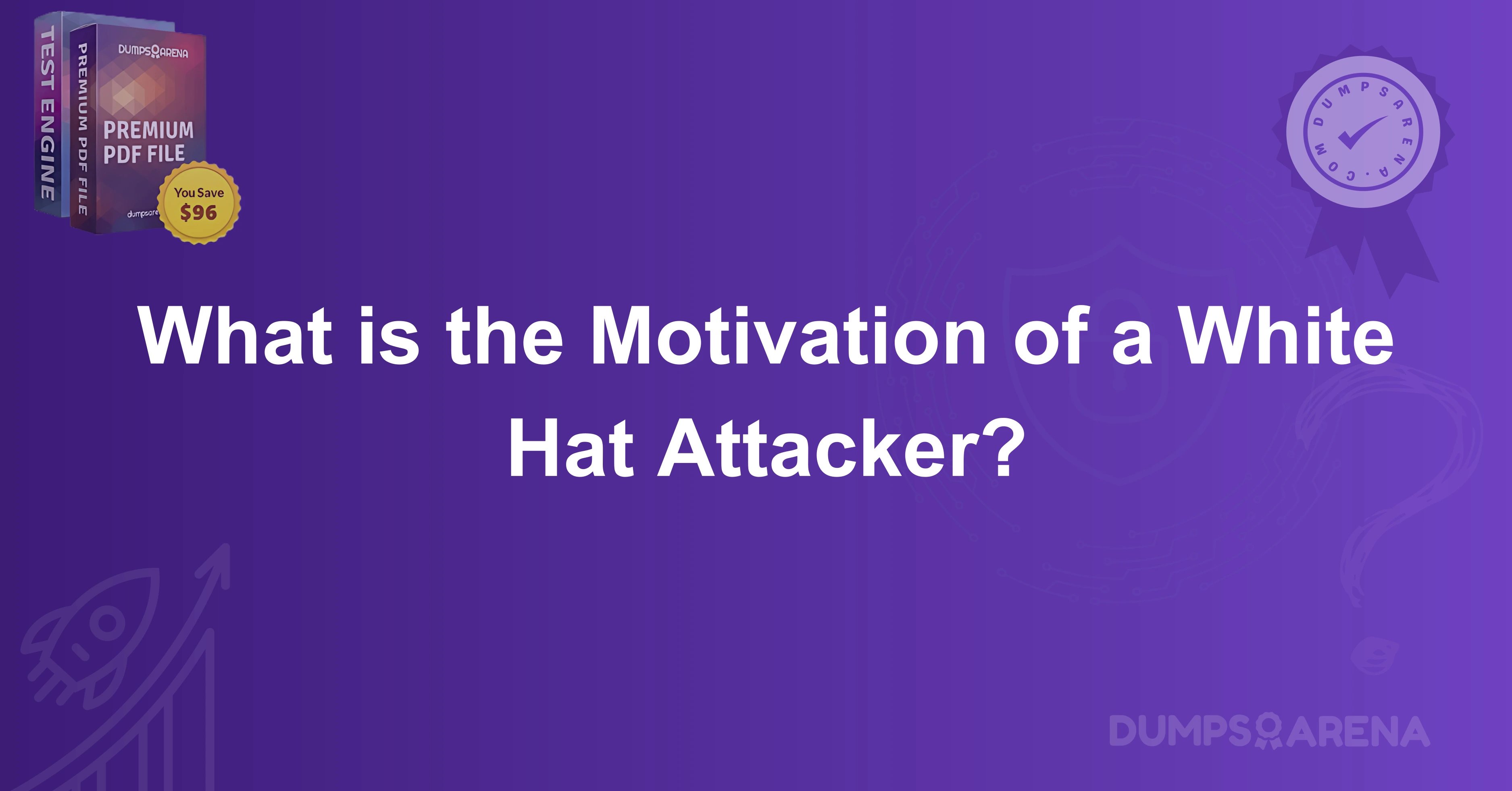Introduction
In today’s digital world, cybersecurity plays a vital role in protecting sensitive information, preventing cyberattacks, and ensuring the safety of digital assets. Among the various players in the cybersecurity ecosystem, white hat attackers stand out as the ethical force that works for good. But what truly drives these individuals to take on the role of a white hat hacker? Understanding the motivation of a white hat attacker helps us appreciate their contributions to cybersecurity and the ethical landscape of the digital age. At DumpsArena, we aim to provide insights into various IT and cybersecurity roles, including those of ethical hackers, to empower aspiring professionals with the right knowledge and perspective.
Who is a White Hat Attacker?
A white hat attacker, also known as an ethical hacker, is a cybersecurity professional who uses their hacking skills to identify and fix security vulnerabilities. Unlike black hat hackers, who exploit systems for malicious purposes, white hat attackers operate with legal authorization and ethical intent. They may work as independent consultants, employees of corporations, or members of cybersecurity firms. Their main goal is to improve cybersecurity by exposing potential weaknesses before malicious hackers can exploit them.
The work of white hat hackers is essential to the integrity of networks, systems, and digital infrastructure across the globe. They conduct penetration testing, vulnerability assessments, and risk analysis to fortify systems against threats. At DumpsArena, we believe that understanding the ethical mindset and motivations behind white hat attackers is crucial for anyone entering the cybersecurity field.
Altruism and Ethical Responsibility
One of the primary motivations behind white hat attackers is their sense of ethical responsibility and a genuine desire to do good. Many ethical hackers are driven by the goal of protecting others from harm. In a digital landscape filled with threats, white hat attackers see themselves as the guardians of security, responsible for preventing data breaches and cyberattacks that can harm individuals, businesses, and governments.
Their motivation stems from the belief that technology should be used for the betterment of society. This altruistic mindset pushes them to identify flaws in systems before malicious actors can exploit them. Whether it's securing financial data, protecting personal information, or ensuring the stability of critical infrastructure, white hat hackers often take pride in making the internet a safer place.
Intellectual Curiosity and Challenge
Another key motivation for white hat attackers is intellectual curiosity. Ethical hacking requires a deep understanding of computer systems, programming, networks, and security protocols. For many white hat hackers, the thrill lies in solving complex problems and outsmarting potential adversaries.
They are often fascinated by the inner workings of software and hardware systems. This curiosity leads them to explore, test, and understand every component of a digital environment. The process of identifying vulnerabilities, crafting exploits (legally and ethically), and then patching them offers a level of intellectual satisfaction that is hard to find in other professions. At DumpsArena, we often highlight the analytical and problem-solving skills required for ethical hacking, showcasing its appeal to technically inclined individuals.
Career Opportunities and Professional Growth
In addition to ethical and intellectual motivations, white hat attackers are also motivated by career opportunities and professional advancement. The demand for skilled cybersecurity professionals continues to grow, with organizations actively seeking individuals who can safeguard their digital assets.
By becoming a white hat attacker, professionals open the door to a range of roles such as penetration tester, security analyst, vulnerability researcher, and cybersecurity consultant. These roles not only offer financial rewards but also opportunities to work with cutting-edge technologies and collaborate with industry leaders.
DumpsArena recognizes the value of these career paths and supports professionals through comprehensive certification exam preparation materials. We help aspiring white hat attackers earn industry-recognized credentials that validate their skills and open new avenues for growth.
Legal Protection and Recognition
Operating within the boundaries of the law is another motivating factor for white hat attackers. Ethical hackers gain legal recognition and protection when they work with the consent of system owners. This legal framework allows them to apply their skills without the fear of prosecution, unlike their black hat counterparts who risk severe legal consequences.
This aspect of legality offers peace of mind and ensures that white hat hackers can focus on their work without ethical dilemmas. They are often acknowledged and appreciated by organizations and the broader cybersecurity community for their contributions. At DumpsArena, we emphasize the importance of ethical conduct in cybersecurity and advocate for responsible behavior in all professional endeavors.
Passion for Cybersecurity and Technology
Passion is a powerful motivator, and many white hat attackers are driven by a deep passion for cybersecurity and technology. They are enthusiastic about staying updated with the latest trends, tools, and threats in the cyber world. This passion fuels their continuous learning and development.
White hat hackers frequently participate in Capture the Flag (CTF) competitions, cybersecurity forums, and ethical hacking conferences. These activities not only enhance their skills but also connect them with a community of like-minded professionals. DumpsArena encourages such engagement by providing resources and study materials that keep professionals informed and prepared.
Contribution to Community and Knowledge Sharing
White hat attackers often contribute to the cybersecurity community by sharing their knowledge, writing blogs, giving talks, and mentoring others. This sense of community and the opportunity to make a positive impact motivates them to stay active and involved.
By disclosing vulnerabilities responsibly, they help software developers and companies improve their products. This collaboration builds trust and strengthens the overall cybersecurity ecosystem. At DumpsArena, we value the role of ethical hackers in knowledge sharing and actively support platforms that promote learning and collaboration.
Conclusion
The motivations of a white hat attacker are diverse and deeply rooted in ethical values, intellectual curiosity, and a passion for cybersecurity. These professionals play a crucial role in defending against cyber threats, fostering trust in digital systems, and advancing the field of cybersecurity. Their work is guided by a strong moral compass, a desire to solve complex problems, and the ambition to grow in a dynamic and rewarding career.
1.What is the primary motivation of a white hat hacker?
A. To cause damage to systems
B. To improve cybersecurity and protect systems
C. To gain unauthorized access to sensitive information
D. To sell vulnerabilities to the highest bidder
2.Which of the following best describes the ethical responsibility of a white hat attacker?
A. To exploit vulnerabilities for personal gain
B. To identify vulnerabilities with the consent of the organization
C. To hack systems without authorization
D. To destroy critical systems for educational purposes
3.What is a major legal benefit of being a white hat hacker?
A. They can hack into any system without consequences
B. They operate under legal contracts and ethical guidelines
C. They can bypass all security protocols
D. They have the right to sell stolen data
4.Which of the following is an example of a white hat hacker's activity?
A. Deploying ransomware to exploit a weakness
B. Testing a network for vulnerabilities with permission from the owner
C. Creating and selling malware
D. Engaging in phishing attacks
5.Why might a white hat hacker engage in Capture the Flag (CTF) competitions?
A. To perform illegal hacking on real-world systems
B. To improve their skills in a legal, ethical environment
C. To disrupt the operations of cybersecurity companies
D. To compete for monetary rewards only
6.Which certification is commonly pursued by individuals who wish to become professional white hat hackers?
A. Certified Information Systems Auditor (CISA)
B. Certified Ethical Hacker (CEH)
C. Microsoft Certified Solutions Expert (MCSE)
D. AWS Certified Solutions Architect
7.What is the primary ethical motivation behind white hat hacking?
A. Seeking fame and popularity
B. Protecting digital assets and sensitive information
C. Causing disruption and harm to competitors
D. Gaining financial rewards from exploiting vulnerabilities
8.Which of the following is NOT a motivation for a white hat hacker?
A. Protecting users from cyber threats
B. Gaining unauthorized access to private systems
C. Enhancing security in digital platforms
D. Helping organizations secure their networks
9.What distinguishes a white hat hacker from a black hat hacker?
A. White hat hackers have no knowledge of programming
B. White hat hackers hack systems with malicious intent
C. White hat hackers work with authorization to improve security
D. White hat hackers are only motivated by financial rewards
10.How do white hat hackers contribute to the cybersecurity community?
A. By selling zero-day exploits
B. By disclosing vulnerabilities to the public without consent
C. By reporting security flaws to the organization responsible
D. By creating malware to demonstrate vulnerabilities
Visit DumpsArena for the latest Certified Ethical Hacker (CEH) 312-50 Study Guide PDF, comprehensive study guides, and expert-designed practice tests from EC-Council to guarantee your CEH certification success!




